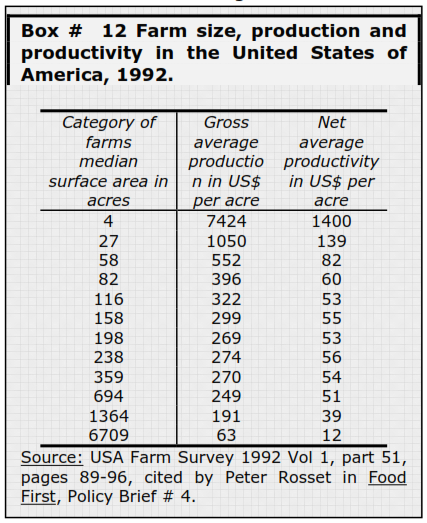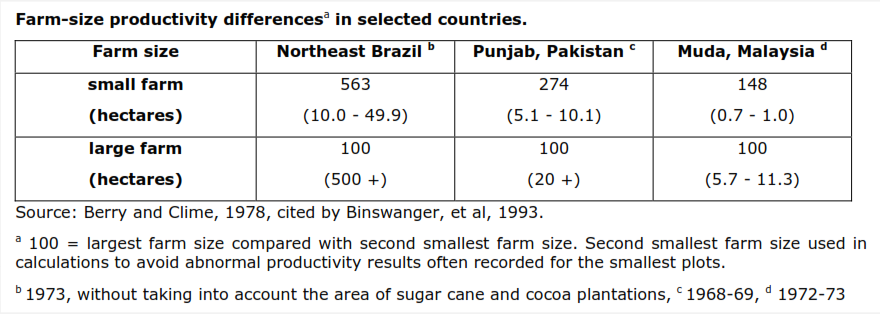- Accaparement des terres
-
Politiques foncières
- Refonder la politique foncière agricole de la France
- Politiques foncières et histoire agraire en Europe
- Les politiques foncières agricoles de la France au XXe siècle
- Le foncier en Afrique de l’Ouest. Fiches pédagogiques.
- Réformes Agraires dans le Monde
- Expérience du Code Rural au Niger
- Politiques foncières et Réforme Agraire. Cahier de Propositions.
- Forêts
- Eau
- Gouvernance des territoires
- FMAT - Forum Mondial sur l’Accès à la Terre 2016
- Autres Conférences et Forums internationaux
- Conférences filmées - Réunions Thématiques AGTER
- Entretiens avec des membres d’AGTER
- Formation - Enseignement
- Formation - Voyages d’étude
- Formation - Modules courts
- Editoriaux - Bulletin d’information d’AGTER
- Préserver l’environnement et les grands équilibres écologiques
- Développer la participation des peuples à la prise de décision aux niveaux national et local
- Respecter les droits humains fondamentaux. Lutter contre les inégalités
- Mettre en place une gouvernance mondiale efficace. Construire la paix
- Assurer l’efficience de la production agricole. En finir avec la faim
- Valoriser et entretenir la diversité culturelle
- Prendre en compte les besoins des générations futures. Gérer les « communs »
Recherche dans les titres, sous-titres, auteurs sur www.agter.org et sur www.agter.asso.fr
Recherche en plein texte sur www.agter.org avec Google
Rechercher dans le moteur Scrutari de la Coredem (multi-sites)
Version française de cette page : Cahier de propositions POLITIQUES FONCIERES ET REFORMES AGRAIRES. Partie I. Comment garantir un accès à la terre conforme à l’intérêt de la majorité de la population ? (1/5) Les avantages de la production familiale
Land Policies and Agrarian Reform. Proposal Paper. Part I. How might access to land be guaranteed in conformity with the interests of the majority of the population? (1 of 5).
A prerequisite: the advantages of family farming
Rédigé par : Michel Merlet, (English version: Mary Rodeghier)
Date de rédaction :
Organismes : Association pour contribuer à l’Amélioration de la Gouvernance de la Terre, de l’Eau et des Ressources naturelles (AGTER), Institut de Recherche et d’Applications des Méthodes de Développement (IRAM), Réseau Agriculture Paysanne et Modernisation (APM), Fondation Charles Léopold Mayer pour le Progrès de l’Homme (FPH)
Type de document : Étude / travail de recherche
Documents sources
Merlet, Michel. Proposal Paper. Land Policies and Agrarian Reforms. AGTER. November 2007. (English version: Rodeghier, Mary). 120 p.
This second question on the distribution of land access is one of the key elements of any agricultural policy. However, the way land is distributed has a far-reaching impact: it affects not only agriculture, but also the entire range of possibilities for economic and social development.
This has been the subject of much controversy over several decades and different policies have been implemented in an attempt to solve the problem of optimising the distribution of land resources.
Today, the debate focuses on two main notions that are often expressed simplistically and dogmatically: government action to correct unequal access to land (agrarian reforms) and the role of the market. We will see the advantage and need for considering land policies that surpass this dichotomous vision.
1. A prerequisite: the advantages of family farming
Before addressing the conditions and policies that permit an optimal distribution of land, we must first recall that small, family farms that employ little or no salaried labour are generally the most efficient economically speaking, and are a fruitful basis for the growth of democratic political systems. Although this assertion was far from being agreed upon in the 19th and early 20th centuries59, it is now widely accepted regardless of the political context.

Small family farms not only possess advantages for the environment and the maintenance of the rural social fabric, they are also generally more productive than capitalist companies. Box 12 illustrates the situation in the USA. Similar situations can be found in most countries, in both hemispheres60.
The experts of the World Bank, Binswanger, Deininger and Feder came to the same basic conclusion in their work on land polices61. See box # 13.
Box # 13 The superiority of family farming in developing countries62
In the conclusion of the chapter devoted to discussing the competitiveness of small farms in their working document written for the World Bank, Binswanger, Deininger and Feder observe that although many empirical studies on the relationship between farm size and productivity lead to methodological problems, those that genuinely consider variations of productivity rather than those of production show that small farms have higher productivity levels than large farms, even in relatively mechanised and developed regions of developing countries.
They use the table below to illustrate their demonstration.

In most farms, there are no economies of scale. On the other hand, economic activity is more rational when production is managed at family farm level, especially if the small farms are equipped with machinery.
Nonetheless, small family farms are not always the most efficient and not all of them ensure the sustainable use of resources63. To do this, they must be able to count on sufficient means and an adequate agricultural policy. This is the case under certain conditions in most of the developed countries.
Thus, the modern family farm is also the result of public policies which allow it to express its potential.64
59 See especially La question agraire by Karl Kautsky regarding Marxist thinking on the subject.
60 See, among others, Peter M. ROSSET, The Multiple Functions and Benefits of Small Farm Agriculture In the Context of Global Trade Negotiations. Food First, policy brief # 4. September 1999
61 Binswanger P. Hans, Klaus Deininger and Gershon Feder, Power, Distortions, Revolt, and Reform in Agricultural Land Relations, Working Paper, The World Bank, July 1993. published in its final form in 1995 in J. Behrman and T.N. Srinivasan (eds), Handbook of Development Economics, Volume III, Elsevier Science B.V. A Portuguese translation of this very interesting paper is available in electronic form on the NEAD Website, under the heading Dataterra.
62 From Binswanger, P. Hans, Klaus Deininger and Gershon Feder, ibid 1993. Portuguese version.
63 The “minifundistas” of Latin America, for example, are often obliged to overexploit natural resources to survive on a daily basis.
64 See especially the analysis for European countries of the genesis of modern family farm production by Claude Servolin, L’agriculture moderne, Paris: Editions du Seuil, February 1989. See also record # 14 - Part II of the paper. C. Servolin, “Denmark. Pioneer in small farming in Western Europe”




 Agter participe à la Coredem
Agter participe à la Coredem